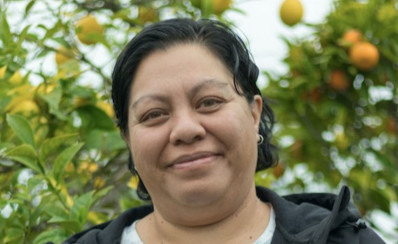Alena Swanell

“I hate the thought of kids not having lunch at school, the idea of people not having enough food.” Alena shares. This desire to keep the community fed and to ensure that no child in Tairawhiti goes without a school lunch stems from her own personal experience of poverty. She recalls a time in her life of being pregnant and only having one potato to eat. It was this experience of food poverty that led to having a deep empathy for people in the same situation and a desire to change it.
Gizzy School Lunches came out of this space and a recent rebranding and expansion meant that Eat Smart Tairāwhiti was born. Alena managed the enterprise for three years as a volunteer before becoming a paid employee. She then became instrumental in the creation of Gizzy Kai Rescue ensuring food that would have gone to landfill was redirected to whanau in need.
Alena gains satisfaction from her efforts. “I feel joy knowing that a child has a full puku or a family has a meal, it makes me feel good.”
When the country went into Lockdown for COVID 19 Alena’s first thought was for the families that regularly received Eat Smart lunches and the children that may not have lunches at home during Lockdown. Many families in Tairawhiti were already experiencing hardship with the impact of Covid-19 on the forestry sector. There were also Kaumatua on fixed incomes struggling to make ends meet. With a deep understanding of the challenges, people were facing Alena felt the need to do something to help.
Alena’s solution was to start a food bank at Equippers Church. The idea of a food bank had been previously discussed, but the idea was fast-tracked due to the pandemic. The logistics, restrictions and research needed to work with the Civil Defence and Ministry of Primary Industries were huge challenges. The Foodbank signed up as a recipient of Gizzy Kai rescue and this collaboration became hugely valuable. A qualified chef came on board and was able to support meal planning and advice on food safety.
Initially, because of Lockdown restrictions, it was Alena’s family who rallied in support of the Foodbank, volunteering their time together keeping within their bubble. As restrictions eased and people returned to their usual commitments and routines this changed. So many volunteers have been wanting to help and more volunteers were able to come on board as the levels decreased. With large numbers of new volunteers, a lot of time was spent on training, particularly ensuring volunteers adhered to restrictions, policies and procedures on top of the strictly regulated COVID 19 guidelines.
While the Lockdown period was exhausting for Alena it did pass quickly and she draws comfort from the knowledge that many families received support at a difficult time.